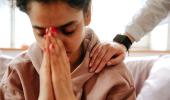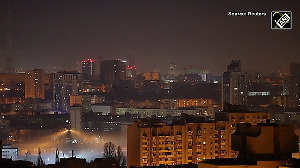Ensure you consume water from a clean source. Your home should be well-ventilated at all times, suggests Dr Gowri Kulkarni.

The much-awaited monsoon season is here. However, monsoon also brings along numerous diseases with it every year.
The risk of being exposed to multiple viruses, bacteria, and other infections is two times higher during monsoon as compared to any other season.
The high moisture content in the air enables harmful microorganisms to thrive, resulting in the transmission of a number of diseases.
The most common diseases during monsoons are transmitted through mosquitoes, contaminated food, water, and air.
Mosquito-borne
The most common mosquito-borne diseases are malaria and dengue.
With the onset of monsoon, mosquitoes thrive in areas with standing water, including rainwater puddles, open tanks, and old tires.
When rainwater remains clogged, it helps the mosquitoes' breeding process.
Precautions
Given the lockdown, the unused, vast, unoccupied spaces are likely to have turned mosquito hotspots.
Therefore, as people return to offices, shops and commercial spaces, it is important to take essential mosquito control measures.
It is recommended to keep your home and surroundings clean, dry and mosquito-free.
Do not let water stagnate in your surroundings.
Use a mosquito repellent and wear full-sleeved clothes while stepping out.
Ensure that your window and door screens are in good repair and are tightly closed.
If you have plants at home, see to it that you don't let over water them or allow small puddles to collect in and around open spaces near the windows and gates.
Contaminated food and water-borne
Rainwater tends to have an adverse effect on the quality of water and contaminates food and basic sanitation facilities.
This causes a surge in breeding grounds for diseases like cholera, typhoid, jaundice, Hepatitis A and gastroenteritis.
Precautions
It is recommended to wash fruits and vegetables thoroughly with water (preferably boiled) before consumption.
You can soak them in warm water or add salt, in case of vegetables to kill tiny germs, if any.
Drinking boiled, treated or purified water can keep germs at bay.
Avoid buying water from outside if the lid is not secure.
At home, keep your foods covered at all times and avoid consuming outside food, especially raw, uncooked foods like salads.
Ensure personal and environmental hygiene is maintained at all times.
Wash your hands regularly, especially before and after using the washroom.
Air-borne diseases
Along with mosquito, food and waterborne disease, monsoon also tags multiple air-borne infections with it.
These infections are transmitted by droplet infection, tiny pathogens (disease-causing viruses) through the air resulting in the common flu, viral fever, cold, cough, and sore throat.
They are mostly mild and can cause minor infections in adults.
Precautions
Cover your mouth and nose while coughing or sneezing- wear a mask to ensure the safety of your family members.
Drink warm water every few hours and carry your own boiled drinking water.
Ensure you consume water from a clean source and that your home is well-ventilated at all times
As COVID-19 reminds us about the need to prioritise healthcare, the time is ripe for us to take all necessary action.
It has become important to ensure complete safety, build strong immunity and seek doctor consultations for yourself and dear ones too.

Dr Gowri Kulkarni is head of medical operations, MediBuddy-DocsApp. She can be contacted on ga@rediff.co.in.











 © 2025
© 2025